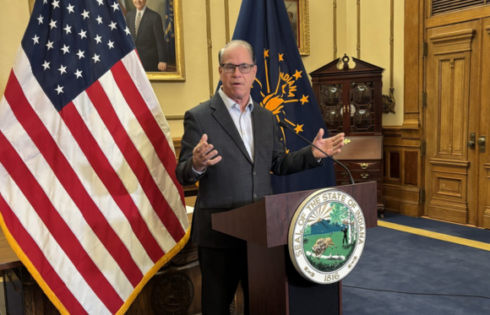A prominent UC Berkeley professor recently linked ignoring global warming with watching people die during a guest seminar at Ohio State University.
Citing monsoons and other extreme weather phenomenon on the other side of the globe, Kirk Smith, a global environmental health professor, said climate change is “a moral issue.”
Smith told an anecdote to the audience of a professor who ignores a drowning child on campus as he rushes to teach a class. He then tells his students about ignoring the child, and they are aghast. Later at home, the hypothetical professor opens his mail and throws away a letter from the United Nation’s Children Fund.
“No one thinks that is immoral, and why not,” Smith said of throwing away the UNICEF letter. “What’s the moral distinction? … Today climate change is a sin of omission.”
What’s more, Smith argued, those who ignore global warming and climate change are not just guilty of a sin of omission, they’re also teetering on the verge of a sin of commission.
“Every time I come back from a site in the Third World, and a $16 pizza would feed a family in Guatemala for an entire month … we’re not going and shooting kids in the head, but we are moving in the distinction a bit to the commission side,” he said.
A sin of commission is, generally and secularly speaking, purposely doing something wrong, while a sin of omission is considered standing on the sidelines and not doing something that’s right.
“There is this connection to the land, the land is a very broad, shared thing,” he said.
Smith is a highly decorated professor who “serves on a number of national and international scientific advisory committees, including the Global Energy Assessment, National Research Council’s Board on Atmospheric Science and Climate, the Executive Committee for WHO Air Quality Guidelines, and the International Comparative Risk Assessment,” according to a biography posted on his website.
Smith’s Ohio State seminar Nov. 16 was titled “Global Warming, Public Health, and Human Futures; Thoughts on Scheffler’s ‘Afterlife’ Thesis.”
Samuel Scheffler, a philosophy professor at New York University, has penned books such as “The Rejection of Consequentialism” and “Human Morality,” and is currently giving a series of lectures around the globe titled “The Afterlife.”
“(Scheffler) argues that, in spite of evidence that people disregard the future beyond themselves … there is even more powerful evidence that we actually act in ways showing that we regard a continuing human future as more important than even our own personal survival or anything else in the present,” Ohio State University’s website states in announcing Smith’s visit.
During Smith’s seminar, hosted by Ohio State’s Center for Historical Research program in health, disease, and environment in world history, the UC Berkeley professor said that something’s got to give for the planet and humanity to survive.
Citing the 2011 Fukushima, Japan, nuclear disaster for context, Smith said that “in our hubris as modern humans, we think we can control anything with engineering.”
Clearly, we can’t, Smith argued.
“I think this energy transition has to happen, because there are too many potentially catastrophic events of the things that we are relying on to run and to keep these seven billion people thriving, at least in keeping our Western Industrial Complex going,” Smith said. “We are exploiting resources that are not in our best interest, nor in the best interest of the future after we’re gone.”
IMAGE: Morak Faxe/Flickr
Click here to Like The College Fix on Facebook.





Please join the conversation about our stories on Facebook, Twitter, Instagram, Reddit, MeWe, Rumble, Gab, Minds and Gettr.